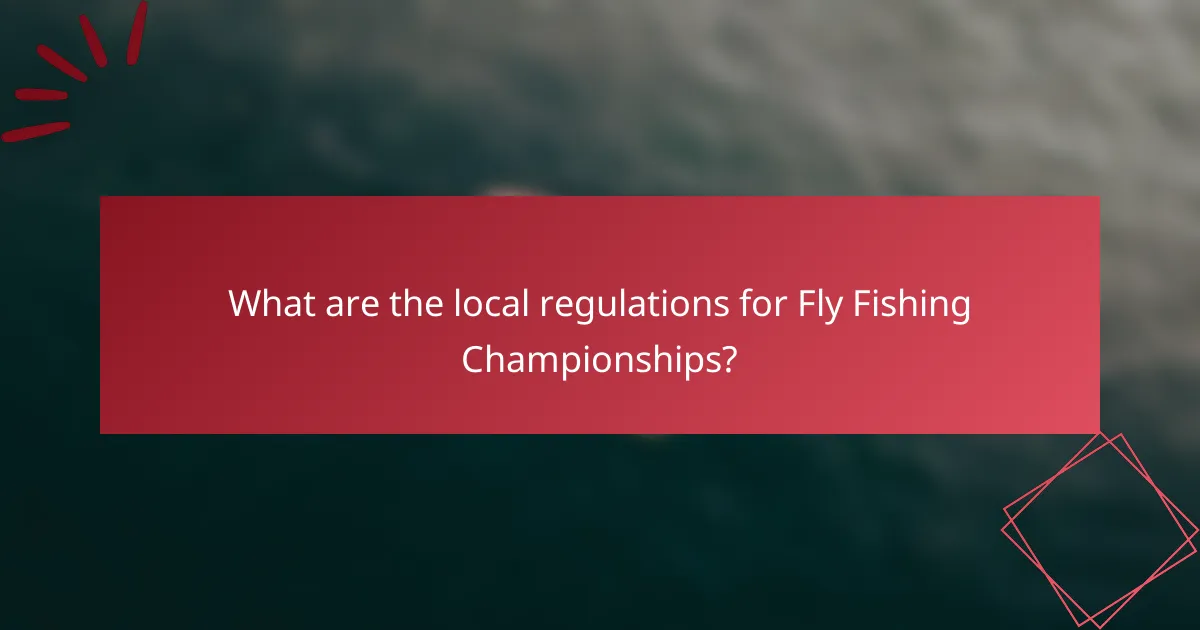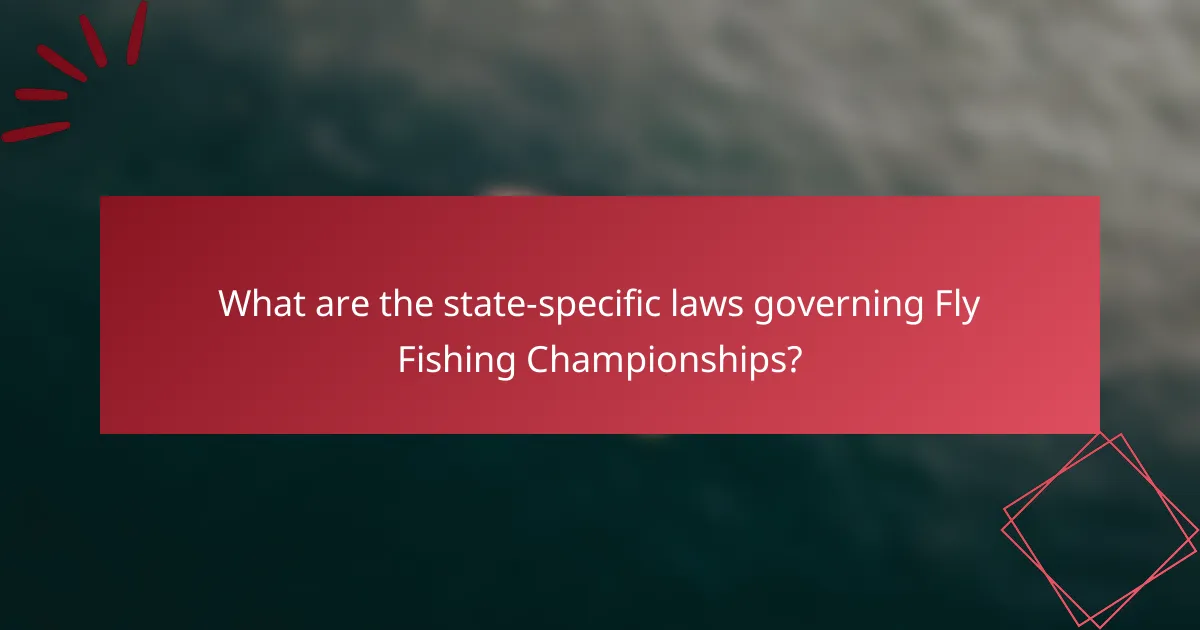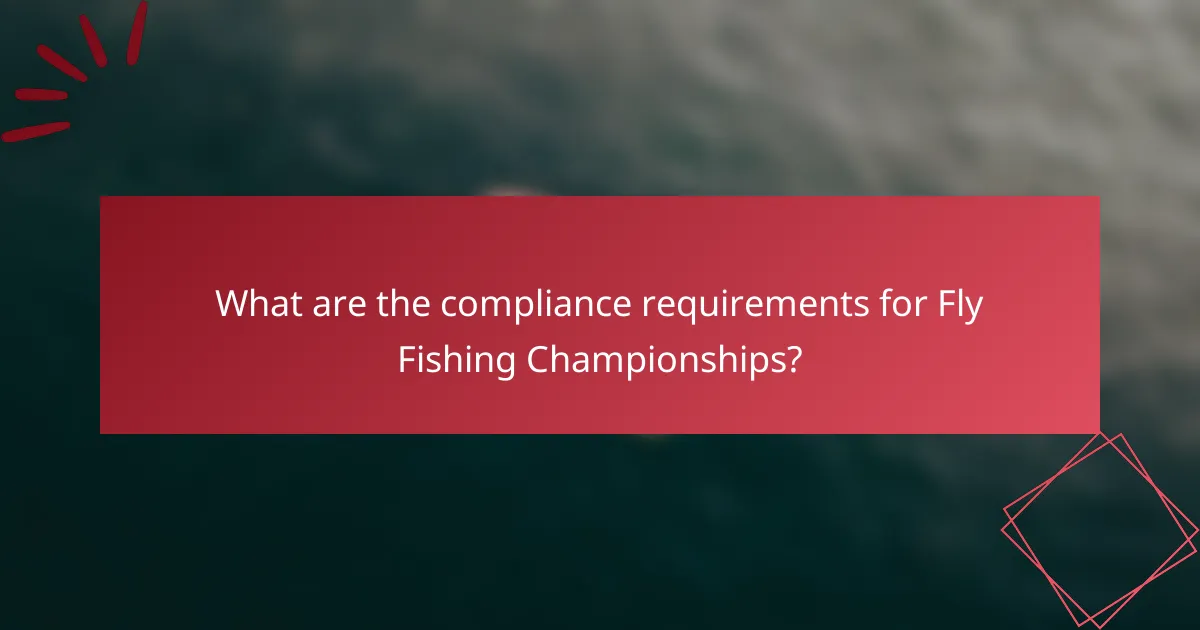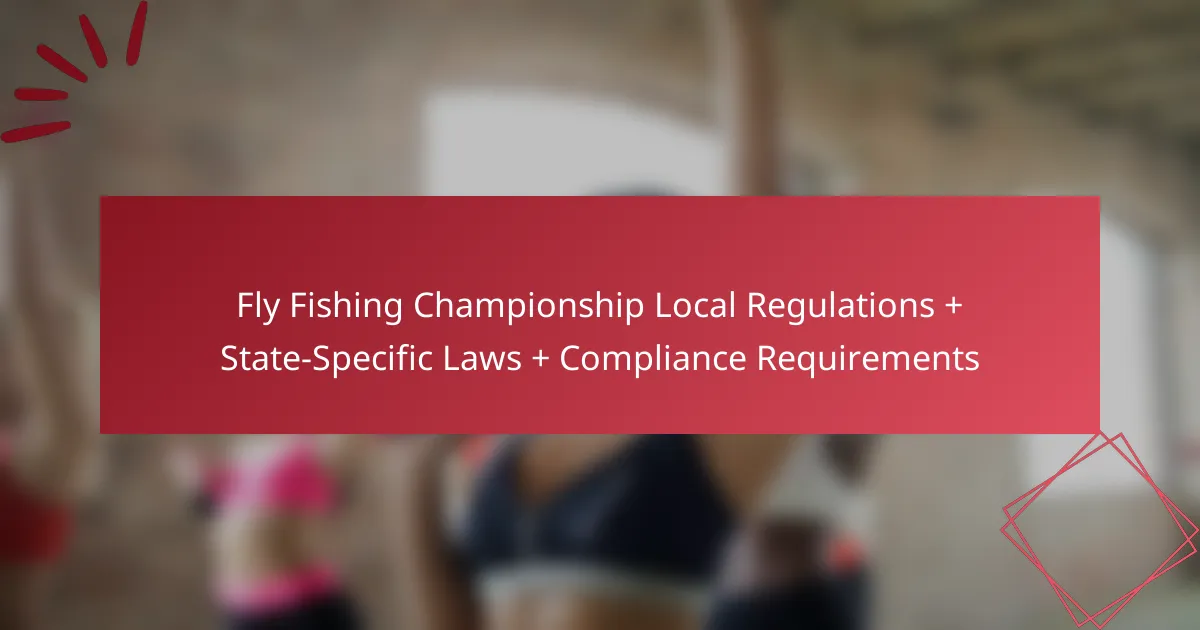Fly Fishing Championships are governed by a variety of local regulations and state-specific laws that dictate the rules of competition. Key regulations include licensing requirements for participants, restrictions on the types of flies used, and catch-and-release practices aimed at conserving fish populations. Compliance with these laws is essential for maintaining the legality of the championships, as violations can lead to penalties or disqualification. Event organizers and participants must familiarize themselves with the specific regulations of their state and adhere to safety measures to ensure fair competition and environmental protection. Consulting local fish and wildlife agencies is crucial for obtaining accurate and up-to-date information on applicable regulations.

What are the local regulations for Fly Fishing Championships?
Local regulations for Fly Fishing Championships vary by location. Each state or region may have specific rules governing the events. Common regulations include licensing requirements for participants. Many areas require a valid fishing license for all competitors. Additionally, there may be restrictions on the types of flies used. Some regions enforce rules regarding catch-and-release practices. Local environmental regulations may also dictate allowable fishing areas. Compliance with these regulations is essential for the legality of the championship. Participants should consult local fish and wildlife agencies for the most accurate information.
How do local regulations impact participants in Fly Fishing Championships?
Local regulations significantly impact participants in Fly Fishing Championships by dictating rules on fishing methods, species limits, and designated fishing areas. These regulations ensure fair competition and conservation of aquatic resources. For instance, specific local laws may restrict the use of certain tackle or require catch-and-release practices. Participants must comply with these rules to avoid disqualification. Additionally, each state may have unique licensing requirements that participants must fulfill. Failure to adhere to local regulations can result in penalties, including fines or loss of eligibility in future events.
What specific rules must be followed during competitions?
Competitions in fly fishing must adhere to specific rules to ensure fairness and safety. Participants must have a valid fishing license as required by state regulations. Each competition will have designated boundaries that must not be crossed. Anglers must use only artificial flies as bait, prohibiting live bait or other fishing methods. Catch-and-release practices are often mandated to protect fish populations. Competitors must record their catches accurately, noting species and sizes, as specified by the event rules. Violations of these rules can lead to disqualification or penalties. These regulations are enforced to maintain the integrity of the competition and promote sustainable fishing practices.
How are local regulations enforced in Fly Fishing Championships?
Local regulations in Fly Fishing Championships are enforced through a combination of monitoring, compliance checks, and penalties. Tournament organizers often collaborate with local authorities to ensure adherence to specific fishing regulations. Compliance checks can include inspections of fishing gear and catch limits. Officials may also observe participants during the event to ensure rules are followed. Violations can result in disqualification from the tournament or fines. Many championships require participants to sign agreements acknowledging their understanding of local regulations. This process helps maintain fair competition and conservation efforts.
Why are local regulations important for Fly Fishing Championships?
Local regulations are important for Fly Fishing Championships because they ensure sustainable practices and fair competition. These regulations govern fishing methods, catch limits, and protected species. Compliance with local laws helps preserve aquatic ecosystems. For example, specific rules may restrict fishing in certain areas to protect spawning fish. Additionally, local regulations can dictate the use of specific gear or techniques. This maintains a level playing field among competitors. Adhering to these regulations also enhances the integrity of the championship. Violations can lead to disqualification or penalties, ensuring all participants follow the same standards.
What are the consequences of not adhering to local regulations?
Not adhering to local regulations can result in significant penalties. Violators may face fines, which vary by jurisdiction and can be substantial. In some cases, individuals may be disqualified from competitions. This disqualification can impact future eligibility in similar events. Additionally, failure to comply can lead to legal action from authorities. Such legal actions can include lawsuits or revocation of licenses. Negative publicity may also occur, damaging reputations. Overall, the consequences emphasize the importance of compliance in local regulations.
How do local regulations promote fair competition?
Local regulations promote fair competition by establishing rules that all participants must follow. These regulations ensure that no single competitor has an unfair advantage. They often include guidelines on equipment, fishing methods, and catch limits. For instance, regulations may specify the type of gear allowed or the number of fish that can be caught. This standardization helps level the playing field among competitors. Additionally, local regulations often include penalties for violations, which deter cheating. Research shows that structured rules enhance participant trust and satisfaction in competitions. This ultimately leads to a more vibrant and competitive environment.

What are the state-specific laws governing Fly Fishing Championships?
State-specific laws governing Fly Fishing Championships vary significantly across the United States. Each state has its own regulations regarding competition formats, eligibility, and conservation practices. For instance, some states require permits for hosting fly fishing events. Others may impose specific catch-and-release rules to protect fish populations. Additionally, local wildlife agencies often oversee compliance with these regulations. Participants must adhere to state fishing licenses and regulations. Violations can lead to penalties, including fines or disqualification from competitions. Therefore, it is crucial for event organizers and participants to familiarize themselves with their state’s specific laws.
How do state-specific laws differ from local regulations?
State-specific laws establish broad legal frameworks applicable across the entire state. Local regulations, however, are tailored to specific municipalities or counties within that state. State laws often cover fundamental issues like licensing and conservation practices for fly fishing. Local regulations can introduce additional restrictions or guidelines based on local environmental conditions or community preferences. For instance, a state may allow fishing year-round, while a local regulation may limit fishing to certain seasons. This differentiation allows local jurisdictions to address unique ecological or social factors. Understanding these distinctions is crucial for compliance in activities like the Fly Fishing Championship.
What are the most common state-specific laws for Fly Fishing Championships?
The most common state-specific laws for Fly Fishing Championships include regulations on fishing licenses, designated fishing areas, and catch limits. Many states require participants to possess a valid fishing license. Specific waters may be designated for championship events, often with restrictions on the type of gear used. States typically enforce catch limits to protect fish populations. Additionally, some states mandate the use of barbless hooks to minimize harm to fish. Compliance with local conservation laws is essential during championships. Each state may have unique regulations that need to be reviewed prior to events.
How can participants find state-specific laws relevant to their competition?
Participants can find state-specific laws relevant to their competition by consulting official state government websites. These sites typically provide comprehensive legal information including fishing regulations. Participants should also check local fish and wildlife agencies for updated rules. Many states publish guides that outline specific laws for fishing competitions. Additionally, participants can access legal databases or resources like the American Sportfishing Association. These resources ensure compliance with local regulations. It is crucial to verify the information periodically as laws may change.
Why is it essential to understand state-specific laws for Fly Fishing Championships?
Understanding state-specific laws for Fly Fishing Championships is essential to ensure compliance with local regulations. Each state has unique rules governing fishing practices, including licensing, catch limits, and protected species. Violating these laws can result in penalties, including fines or disqualification from competitions. Additionally, adhering to state regulations promotes sustainable fishing practices. This helps preserve fish populations and ecosystems for future generations. Knowledge of these laws also enhances the overall integrity of the championship. Participants who respect local regulations contribute to a fair and responsible fishing environment.
What role do state agencies play in regulating Fly Fishing Championships?
State agencies regulate Fly Fishing Championships to ensure compliance with local laws and environmental protections. They establish rules regarding fishing licenses and permits required for participants. Agencies monitor fish populations and habitats to maintain ecological balance during competitions. They enforce regulations on catch limits and species conservation. State agencies also provide oversight to ensure fair competition and safety standards are met. Their role includes coordinating with event organizers to align on regulations and logistics. By enforcing these guidelines, state agencies help preserve aquatic ecosystems while promoting responsible fishing practices.
How can ignorance of state-specific laws affect competition outcomes?
Ignorance of state-specific laws can significantly impact competition outcomes in fly fishing championships. Competitors may inadvertently violate regulations, leading to disqualification. For example, specific fishing licenses or gear restrictions often vary by state. Failure to comply with these laws can result in penalties or loss of eligibility. Additionally, lack of awareness may give an unfair advantage to those who understand the regulations. This knowledge gap can skew competition results, affecting rankings and prizes. Ultimately, understanding local laws is crucial for fair play and compliance in competitive fishing events.

What are the compliance requirements for Fly Fishing Championships?
Compliance requirements for Fly Fishing Championships include adherence to local regulations and state-specific laws. Participants must possess valid fishing licenses as mandated by state authorities. Additionally, they must follow designated fishing methods and equipment restrictions set by the championship organizers. Tournament rules often include catch-and-release policies to promote conservation. Safety regulations, such as wearing life jackets in specific waters, may also apply. Compliance with these requirements ensures fair competition and environmental protection. Failure to meet these standards can result in disqualification or penalties.
How can participants ensure compliance with local and state regulations?
Participants can ensure compliance with local and state regulations by thoroughly reviewing the specific laws applicable to their location. They should familiarize themselves with local fishing regulations, including permitted species, size limits, and seasonal restrictions. Participants must also obtain any necessary fishing licenses or permits required by state authorities. Regularly checking updates from local wildlife agencies can provide current regulation changes. Additionally, adhering to guidelines set by the Fly Fishing Championship organizers will help maintain compliance. Understanding the rules helps avoid penalties and ensures a fair competition.
What documentation is required for compliance in Fly Fishing Championships?
Fly Fishing Championships typically require several key documents for compliance. Participants must present a valid fishing license specific to the state where the championship occurs. Additionally, proof of registration for the championship is necessary. Compliance with local regulations may also necessitate a signed waiver or release form. Some championships might require proof of adherence to specific fishing gear regulations. Participants should also be prepared to provide identification for verification purposes. These documentation requirements ensure adherence to state-specific laws and local regulations governing fishing competitions.
How often do compliance requirements change for Fly Fishing Championships?
Compliance requirements for Fly Fishing Championships typically change annually. Regulatory bodies review and update rules based on environmental assessments and participant feedback. Changes can also occur mid-season if significant issues arise. For instance, new conservation measures may be implemented to protect fish populations. Local regulations often align with state-specific laws, which may vary in frequency of updates. Keeping abreast of these changes is crucial for participants to ensure compliance. Regularly consulting official tournament announcements and state wildlife agencies is recommended for the latest information.
What best practices should participants follow for compliance?
Participants should adhere to local regulations and state-specific laws to ensure compliance. They must familiarize themselves with the rules governing the fly fishing championship. This includes understanding permitted fishing methods, equipment restrictions, and designated fishing areas. Participants should also keep up-to-date with any changes to regulations before the event. Maintaining proper licenses and permits is crucial for legal participation. Additionally, participants should respect catch limits and size restrictions to promote sustainability. Reporting any violations or suspicious activities helps maintain the integrity of the championship. Following these best practices ensures a fair and responsible fishing experience.
How can participants stay updated on changes in regulations and compliance requirements?
Participants can stay updated on changes in regulations and compliance requirements by subscribing to official newsletters from regulatory bodies. Many state fish and wildlife agencies provide regular updates via email. Participants should also follow relevant social media accounts for real-time announcements. Attending local meetings or workshops hosted by regulatory agencies can provide direct insights. Additionally, joining local fishing clubs or associations often offers access to shared knowledge and resources. Regularly checking official websites ensures participants have the latest information. Engaging with online forums dedicated to fly fishing can also facilitate knowledge sharing among peers.
What resources are available for understanding compliance in Fly Fishing Championships?
Resources for understanding compliance in Fly Fishing Championships include official tournament rulebooks and state fishing regulations. These documents outline specific requirements for participation and adherence to local laws. Websites of governing bodies, such as the International Game Fish Association (IGFA) and local fishing clubs, provide detailed guidelines. Additionally, forums and online communities dedicated to fly fishing often share insights on compliance. Local government agencies also publish resources regarding fishing laws and regulations. These materials ensure that participants are informed about necessary compliance measures.
The main entity of this article is the Fly Fishing Championship, which is governed by local regulations and state-specific laws that dictate the rules of participation and compliance requirements. Key topics include the variation of regulations by location, the impact of these rules on participants, and the importance of adhering to local and state laws for fair competition and environmental conservation. The article outlines specific compliance requirements, documentation needed for participation, and best practices for staying informed about regulatory changes, ensuring that competitors understand their obligations to maintain the integrity of the championship.
